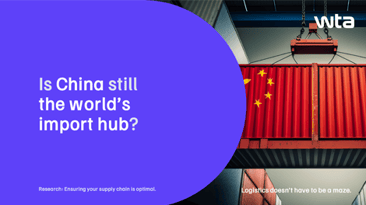On 31st March 2023, the UK government announced negotiations had concluded on accession to the Comprehensive and Progressive Agreement for Trans-Pacific Partnership (CPTPP) and that the UK is set to join the bloc.
The CPTPP is a free trade agreement (FTA) currently between 11 nations: Australia, Brunei, Canada, Chile, Japan, Malaysia, Mexico, New Zealand, Peru, Singapore, and Vietnam. A group of countries with a combined GDP of £9 trillion in 2021 and in the 4 quarters to the end of Q3 2022, £110.9 billion worth of trade with the UK. Around 6.8% of the total.
On the surface at least, free access to a market of over 500 million people feels like a substantial boost to post-Brexit trade for UK businesses both importing from and exporting to the region. But is the deal all that it seems?
Here we’ll look at the agreement in detail and what UK businesses can expect to gain from what government is calling “the biggest trade deal since Brexit”.
Advantages of joining the CPTPP for UK firms
Ascension to the CPTPP presents a good opportunity for UK businesses. It means the removal of tariffs on over 99% of good and service trade between with the 11 nations in the bloc. It also brings the removal of much international trade bureaucracy. That is certain to bring about a boost in trade and with-it additional jobs and growth possibilities.
The bloc is purely centred around removal of trade barriers, with no additional membership requirements and undoubtedly strengthens the UK’s profile and prominence in the Indo-Pacific region.
“65% of the world’s middle-class consumers are expected to be in Asia by 2030”
Department for International Trade, UK
Costa Rica, Ecuador, and Uruguay have all formerly applied to be part of the CPTPP. Thailand, the Philippines, and South Korea are reportedly interested. The addition of any of those will only strengthen the trading opportunities for UK businesses.
Joining the bloc will add procurement opportunities for firms. Lowering the price of imports from the selected nations, particularly in the mechanical goods and chemicals industries. Furthermore, access to additional customers will strengthen the resilience of UK businesses in the face of turbulent economic times. A company with a substantial exporting presence, across several nations is more valuable and less susceptible to economic shocks.
In particular, the industries expected to see an exporting benefit are alcohol and cars, where taxes in Malaysia of 80% and 30% respectively are to be eliminated.
“As part of CPTPP, the UK is now in a prime position in the global economy to seize opportunities for new jobs, growth and innovation. British businesses will now enjoy unparalleled access to markets from Europe to the south Pacific."
Former UK Prime Minister Rishi Sunak
Limitations of the CPTPP deal for UK businesses
There are two key limitations of this deal, which contribute to its minimal impact on GDP, expected to be 0.08%.
The first is the modest trade done at present with the nations involved, when compared with some of the UK’s biggest trading partners. In 2022, UK goods imports from CPTPP countries totalled £35.4bn, roughly half the £70.4bn received from China alone in the same time frame. Meanwhile, goods exports to the trading bloc were £34.8bn, way down on EU goods exports which totalled £194.8bn.
However, at this stage, justified criticism of that observation would be this deal is laying the foundation for more enhanced trade with the nations involved in the years to come. It’s certainly true that there is great appetite for British goods in culturally similar allies such as Australia, Canada and New Zealand. This agreement will be a boost to businesses exploring those nations as export markets.
“Sitting here today, trade with these nations is substantially down on the UK's biggest economic partners. So immediate import and export opportunities will be limited. But there’s no doubt this agreement is with the long term in mind. As more nations join, it could be a sizable boost for UK firms in the years to come.”
Liam Launders, Head of Sales - WTA
It’s also true that more business leaders are considering a China Plus One approach for their supply chains, in the wake of Covid-19 logistical issues and a deteriorating political relationship. Prime Minister Rishi Sunak said last year that the UK’s “golden-era” of relations with China are over and closer economic ties had been “naïve”. A favourable trade deal with the likes of Vietnam, Malaysia, Mexico and Peru could offer a valuable alternative for UK firms relocating their imports.
In fact, we have explored the feasibility of other options for UK business imports in our recent whitepaper titled ‘Is China still the world’s import hub?’. It also looks at the strengths and weaknesses of importing from China in 2023 and provides guidance for choosing a new import market. You can download it for free below.
However, the previous point brings us to the second limitation of the deal. The UK already has existing trading relationships with 10 of the 11 countries involved. Malaysia is the only nation where the UK doesn't have trading ties of some description.
Although these deals vary in their span. Australia, Canada, Mexico and Vietnam for example, had a free trade agreement in existence already, meaning ascension to the CPTPP will bring limited additional benefit. However, where the change is more noticeable is in trade with nations such as Chile, Japan and Singapore, where only limited agreements are in place currently.
Finally, it’s worth highlighting the possible implications the deal could have on relations with the EU. It could be seen as a move away from the European Union and damage ties which have been through turbulent times in the last decade.
However, the UK has a long-term Free Trade and Cooperation agreement now in place with the EU, which doesn’t appear to be under pressure. Relations have been improved by the signing of the Windsor Framework, which has ended uncertainty over Northern Ireland’s position in the EU Customs Union.
Conclusion
Whatever the impacts the UK’s ascension into the CPTPP are, they are likely not to be felt for some time. The 0.08% increase on GDP being touted is over a 10-year period. Before that, the agreement faces a lengthy ratification process where it will need to pass through periods of scrutiny in the House of Commons and House of Lords.
However, the signature is the conclusion of 21 months of talks and does further the pro-business agenda being set out by the UK government. It gives UK businesses improved access to some exciting Asian economies, where explosive growth is forecasted and some culturally similar nations with a real appetite for buying British.
To read more about how exporting more can drive growth for businesses in turbulent times, check out our recent whitepaper. Focusing on some exciting export markets and highlighting secret advantages that only British businesses can enjoy on the international stage.









